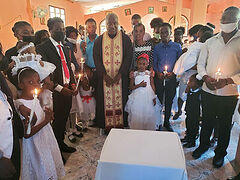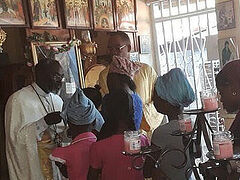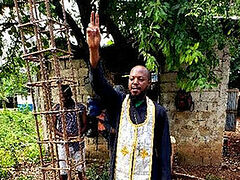Sometimes one can only marvel at what remote corners of the globe Russian Orthodoxy has penetrated. Recently I saw an appeal from the ROCOR (the Russian Orthodox Church Outside of Russia) Fund for Assistance to support the Russian Orthodox Mission in Haiti. Our faith is present in Haiti too. We talked with Alena Plavsic, the Fund’s Development Manager, about how our brothers and sisters live and what they need in this country, which over the past twelve years has experienced several devastating earthquakes and hurricanes, rampant crime, and recently even the assassination of its President.
 Pascha in the parishes of the ROCOR Mission in Haiti
Pascha in the parishes of the ROCOR Mission in Haiti
—I think it is not only me who is surprised that there is a Russian Orthodox mission in Haiti. Please tell us how it appeared there and how it works.
—The Mission was founded by Archpriest Gregory Williams, an American Orthodox priest who served in ROCOR. It was he who in the 1990s went to preach to truth-seekers in Haiti. Now the Mission comprises seven parishes and has around 3,000 members. They are all locals, Haitians.
One of the main challenges in our work with Haiti is that there are many cultural differences. From my personal experience with these people I can say that they don’t like to talk about their problems or complain about something. They endure all hardships stoically and always prefer to say: “Everything is okay. We're moving forward.”
—Although it’s hard to call life in a country that has suffered so many disasters “normal”, and it isn’t easy to move forward there, right?
—Since the earthquake of 2010 many Haitians have lived in tents. We send them money. Haitians don’t always give us reports, but we know that many members of the Mission have built their own houses with our support—albeit very small ones, sometimes even without windows and doors. They just cover their window openings with sheets. These people are sustained by the support of our donors.
—What kind of assistance does the Fund provide to the Mission?
—I have been working with Haiti since 2008. At first we provided little support, but in 2010 there was an earthquake and Haitians were in great need. At that time the whole world was watching what was happening in Haiti. Our Fund raised about $220,000. For us this was a huge amount, because at that time we were a very small non-profit organization, and indeed we still are.
Last year we transferred a little over $100,000, and over the recent years this amount has exceeded $1.6 million.
 —The earthquake and hurricanes almost wiped out half the country, and recently a terrifying increase in crime has been added to all the difficulties. Bandits drive freely around the streets and can kidnap anyone, and even the country's president, Jovenel Moïse, was fatally shot in an attack not long ago. How do the Orthodox live under such circumstances and how do they keep their faith?
—The earthquake and hurricanes almost wiped out half the country, and recently a terrifying increase in crime has been added to all the difficulties. Bandits drive freely around the streets and can kidnap anyone, and even the country's president, Jovenel Moïse, was fatally shot in an attack not long ago. How do the Orthodox live under such circumstances and how do they keep their faith?
—It seems to me that these people live just like everyone else, with the sole difference that they are Orthodox and receive help from us. The Mission is now run by Fr. Jean-Chenier Dumais, who is assisted by Rose Legoute, the widow of the second priest, the late Father Grégoire Legoute. These are highly educated people, and their work is very important.
In the capital, Port-au-Prince, there are two or three Russian churches, and the rest are scattered in other towns. A few years ago our Fund sent two people to Paris to study at the St. Sergius Orthodox Theological Institute so that after graduation they could return and become priests.
By the way, one of the problems is that most Haitians speak only French. In this regard, we have to send them to study in Paris, although it would be easier for us to send people to the American Holy Trinity Seminary in Jordanville.
Unfortunately, only one of the two seminarians returned home from Paris, but we have no right to judge the person who remained in France. After all, even those who do not return to their homeland try to support the Mission as far as possible. In my opinion, Haitians are a really wonderful and very heroic people who do a lot for their fellow countrymen. Many of them could flee from all these problems and go to live in a more prosperous place, but they say, “This is my country. I won’t go anywhere, but will stay here.”
—How does the Fund support the Russian Mission now?
—We organize regular fundraising campaigns, write letters to our donors, and people respond. They are very supportive of our Mission in Haiti and really help strengthen Orthodoxy there. Of course, there is also an element of conversion here, but many do not come to the Church immediately. They just see the life of the Mission and like it.
For example, Matushka Rose and Fr. Gregoire once founded a school for disabled children, Foyer d’Amour (“the Home of Love”), on the grounds of their parish. Through this school, children are introduced to Orthodox culture.
I would say that in Haiti it is especially hard for people with disabilities because of stigma. That they have children with special needs is sometimes hidden from others. Such children just stay at home and can’t go anywhere because others will think something bad of them.
The same school—one of the few in the country for such children—helps them feel like members of society. Excellent teachers work there—by the way, they are members of the Mission. This is very important because it demonstrates that the Mission can provide for itself, albeit not yet financially. Most families in the Mission are very poor, as is the whole country, so it is very important for them that their children get a hot lunch at school. For many of them this is the only meal of the day. Likewise, their school uniforms are the only decent clothes they wear and they try their best to keep them clean. The situation with education in Haiti is tragic, and church schools, thanks to our Fund, help these children not only become Orthodox Christians, but also get a chance for a better life.
I will note one more important thing: As far as I know, all good schools in Haiti are private and based in parishes—Protestant, Catholic, and sometimes, as in our case, Orthodox. As a rule, children choose the denomination of the school they go to. I have mentioned the most famous school in the Russian Mission, but they are also in our other parishes. When children study there, not only their parents, but also their neighbors see how good it is, and want to join them. This is how the Mission develops.
—Listening to your story about the Russian schools in Haiti, I remembered St. John of Shanghai, who set up an orphanage—first in Shanghai, and then in San Francisco—and thus helped many people discover Orthodoxy. Is it the same story here?
—Yes, one hundred percent. St. John is dearly loved in Haiti, where there is even a parish in his honor.
—And what do people need most of all, in addition to education?
—A few years ago, one of our administrators went to Haiti. When she returned, she said, “I don’t care what they spend money on, but if someone sends five dollars there, it can save someone’s life. People are in a really difficult situation—they need any help, in everything.”
Firstly, people have nowhere to live, since many, as I said, still huddle in tents. They need food, water and medicine. For example, the daughter of one of our readers in Port-au-Prince was injured in the recent riots. She was at home hanging out laundry, when a bullet from the street flew in through the window and wounded her. There is nothing in the hospitals there now—they are simply closed; but the Mission found a doctor who operated on her and saved her life.
In addition, we have a special program to help Orthodox families in Haiti. We transfer funds, and the members of the Mission decide for themselves what needs to spend them on. Let's say people can't work because they were crippled by an earthquake and need support. For example, we have a woman named Rochelle, aged forty-two. She worked as a laundress, but due to health issues she could no longer wash clothes. Her children had to drop out of school, and they had nothing to eat. The situation was critical. Rochelle attends our parish in Les Cais, in the south of the country, and as part of this program she began to receive a small amount of money monthly. As a result, her sons went back to school, she opened her own small business and started selling coal. Her neighbors changed their attitude towards Rochelle, and she herself began to help others. Thus, the woman’s life really improved thanks to this support. Perhaps this is the most recent and most striking story, but far from the only one.
 —How do people in the USA and other wealthy countries respond to your calls to help Haiti?
—How do people in the USA and other wealthy countries respond to your calls to help Haiti?
—Mostly benevolently. Ninety-nine percent understand that people are simply dying there. But some do not know at all that there is a Russian Orthodox Church in Haiti. We must admit, it is hard to imagine, especially since there are no Russians there. Some are ready to donate to other causes, but do not understand why they should help Haiti. This does not mean that they are bad people; perhaps they have simply never encountered such a situation and it is hard to feel it deeply because Haiti is far away.
We don’t force anyone to donate to Haiti. We ask, and if someone’s heart misses a beat and he wants to contribute, he will. If someone wants to give money for another purpose—thank God, this is wonderful, too. We have many projects, and the donors themselves choose which one to donate to.
Sometimes we are asked why we do not help children in Ukraine or Russia. But the very name of our Fund suggests that we help within the ROCOR jurisdiction and simply cannot send money to someone outside it. However, even despite this, some donors have sent funds through our Fund to children in Donbass, and more than once.
—Why is the Russian Orthodox Mission in Haiti so important for ROCOR and for Russian Orthodoxy in general? Why not transfer funds somewhere else?
—Such calls are sometimes heard, and it is completely understandable—you must first take care of your neighbors. As Christ said, It is not meet to take the children’s bread, and to cast it to dogs (Mt. 15:26). But Haiti is a completely different story. These Haitians are people who have really found Orthodoxy, they have come to love Christ, the Russian Orthodox Church, and the Russian saints. They entered under the jurisdiction of ROCOR and were accepted, which means that they are already ours, and we must support them. After all, if not us, then who?



